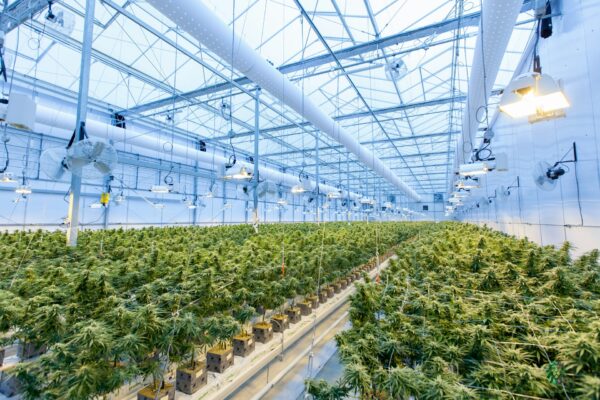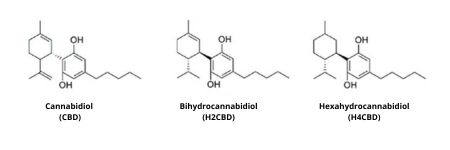Have a question? 06 70 73 89 02
🔞 Not for sale to under 18s
Have a question? 06 70 73 89 02

You've read the article's title: today we're going to talk about H2CBD. As you've probably guessed, it's a synthetic molecule created in the laboratory. It sits right between CBD and H4CBD.
At least on a molecular level, because as we shall see, in terms of bioavailability and interactions with endocannabinoid receptors and the effects produced, there are a few subtleties.
We'll tell you all about it!
H2CBD, like H4CBD, is a CBD molecule that has been hydrogenated. We talked about this back when H4CBD was on the rise, just over a year ago.
Schematically, this involves adding hydrogen atoms to a CBD molecule: 4 hydrogen molecules for H4CBD and 2 for H2CBD.
In the case of H4CBD, we speak of complete hydrogenation, as tetrahydrocannabidiol is a stable compound, while in the case of H2CBD, or bihydrocannabidiol, we speak of partial hydrogenation.
Like its 4-hydrogen counterpart and many other cannabinoids, both natural and synthetic, H2CBD was discovered in 1940 by a group of researchers led by Alexander R. Todd. This English biochemist from Manchester University, winner of the Nobel Prize for Chemistry in 1958, is credited with the discovery of CBD and the first complete synthesis of CBN.
Following the discovery of CBD, the chemist and his group carried out a number of manipulations, including the hydrogenation of the newly-discovered CBD. As a result, H2CBD and H4CBD were synthesized for the 1st time.
As we've said, hydrogenation is the addition of hydrogen atoms to a molecule or other atoms to form a new molecule. Typically, this is the natural hydrogenation of oxygen to form water: H20.
In the case of CBD, it's a little different, because this hydrogenation is not natural, but produced in a laboratory. The process used for this is over a century old. It is widely used in the food and cosmetics industries, notably on oils. This is the process used to create margarine. Hydrogenation produces a kind of butter from vegetable oil.
Nevertheless, although the process is safe, any chemical manipulation can leave undesirable residues, such as traces of heavy metals. These residues must be properly removed from the compound at the end of the process. That's why we always advise you to buy this type of product onlyfrom trusted retailers.
As you know, although hydrogenated forms were discovered over 80 years ago, studies on them remained anecdotal for a long time. Until the authorization of CBD in France and, more broadly, the decriminalization of Cannabis worldwide drew the attention of scientists and industry alike.
But although things are changing, the sheer number of molecules to be studied, the limited number of researchers available and the minimum duration of an exhaustive study of a molecule mean that our knowledge of them is progressing rather slowly. Nevertheless, the few data we do have on the subject and consumer feedback can give us some material to approach the question of the effects of these molecules.

CBD is known for its relaxing properties, which are believed to help with stress and pain management, as well as helping people to fall asleep - the main effects sought by consumers. Unlike many other cannabinoids, CBD has no high, sensory or cognitive effects.
H4CBD and H2CBD are not very different, except in terms of potency. At equal concentrations, the hydrogenated forms of CBD have roughly similar effects , with a tenfold increase in potency.
In fact, the hydrogen atoms added to the molecule enable it to be more bioavailable and interact more strongly with endocannabinoid receptors. In this respect, it would appear that H2CBD has a more relaxing effect than CBD, and H4CBD even more so than H2CBD.
Studies on the medical applications of CBD have already provided us with a wealth of information. It could prove useful in many cases. Notably in the treatment of depression, insomnia, certain autoimmune diseases, chronic pain and anorexia. It may also be able to help the body regulate blood sugar levels and libido, and treat the advancement of arthritis.
H4CBD and H2CBD also seem to have the same properties, with the same potency of action as CBD, except in certain areas.
Initial studies suggest that H4CBD, with its greater relaxing power than CBD, may be more effective in treating stress, anxiety and depression.
As for H2CBD, its anti-inflammatory action is far superior to that of CBD. This suggests a real benefit in the treatment of arthritis, sports recovery and inflammation in general.
For the time being, H2CBD is fully legal in France and most other European countries. And although these molecules are showing promise in a number of areas, we still don't know enough about them to be sure of the absence of undesirable effects in the medium and long term.
Nevertheless, research on this subject is ongoing, and will be decisive for their future in the legal and medical fields.
Did you enjoy this article? Feel free to share our blog!